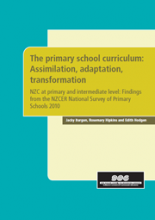NZCER's Education leadership practices work
You are here
Education leadership practices
Recent Education leadership practices research publications
The Post Primary Teachers’ Association (PPTA) asked the New Zealand Council for Educational Research (NZCER) to provide an overview of the research literature on barriers and supports for women to succeed in secondary school leadership.
2019 was the third year that the Teaching, School, and Principal Leadership Practices Survey (TSP) was available for free use by schools. The questions in this survey draw on a strong body of evidence about effective practices. The TSP asks teachers and principals to rate how often a practice occurs or how well the practice is done.
The Teaching, School, and Principal Leadership Practices Survey tool (TSP) was available for free school use for the second consecutive year in 2018. It was used by 265 schools that wanted an evidence base for understanding and developing their practices for the benefit of students.
This report gives the aggregate picture for those schools. Compared with the national school picture, schools using the TSP included fewer small, rural, decile 1–2 schools, and schools with high Māori enrolment.
There is considerable variability between schools, but overall, school characteristics did not seem to be playing a strong role. This suggests that aspects that are challenging require system-wide support.
What lessons can Communities of Learning draw from WAPA 2020, a network of West Auckland schools which have worked together since 2009?
SpringboardTrust is a non-profit organisation whose aim is to improve student outcomes through improving the effectiveness of principals. This is the executive summary of NZCER's evaluation of the short-term impact of its flagship programme, the Strategic Leadership for Principals Programme (SLPP).
This article is drawn from the Teachers of Promise research which has followed a group of promising teachers, now in their ninth year of teaching. It discusses how school leadership shapes the working environment for teachers.
The latest report from the NZCER national survey series looks at how the New Zealand Curriculum (NZC) is being implemented in the country's primary and intermediate schools. The primary school curriculum: Assimilation, adaptation, transformation draws on data from our 2010 survey to explore differences across the sector in terms of progress on curriclum implementation, three years on from the publication of the NZC in 2007. Issues covered in the report include: how confident principals and teachers are with the curriculum, which aspects they view as most important, the professional learning teachers are doing and the challenges of creating a curriculum to meet the learning needs of all students.





